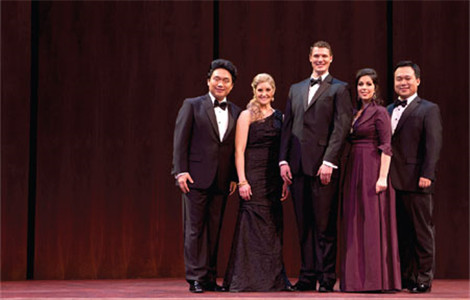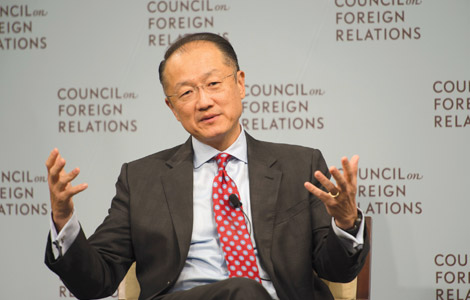Guangxi has new holiday to sing about
Updated: 2014-04-04 07:10
By Xinhua (China Daily)
|
||||||||
Residents of the Guangxi Zhuang autonomous region are enjoying a new two-day official holiday the local government is offering in the hope it will encourage participation in an annual ethnic minority singing festival.
On the third day of the third month of the lunar calendar, crowds traditionally gather to sing in the antiphonal (call-and-answer) style, with the occasion a time for locals to find love and make new friends.
It is observed by more than 27 million people of the Zhuang, Yao, Miao, Dong and Mulam ethnic groups in Guangxi, or half the region's population.
However, the 1,300-year-old custom has lost its allure in the modern era, prompting government action to help it survive and regain popularity.
With the third day of the lunar calendar's third month falling on Wednesday, the day was a major test of whether the festival could be reintroduced.
Before dawn on Wednesday, the first day of the new holiday, Deng Zhiting from Dakeng got up to take part in a government-organized singing get-together that was attended by thousands of Zhuang and Yao people.
The 72-year-old dressed in the traditional costume of the Yao ethnic group and carried a flutelike instrument made of leaves from pineapple and bamboo trees.
But the high-spirited elderly man frowned after seeing few young faces in the crowd. "What a lean time for our group's folk songs. We don't have young people to inherit the treasure," he said.
Deng mastered folk songs at the age of 12 and later won the heart of his wife with his golden voice. Nevertheless, today in Dakeng, home to 600 Yao people, none of those younger than 35 can sing folk songs, said Deng, whose children and grandchildren know nothing of the art.
He blamed the trend on an exodus of young people resulting from China's urbanization drive.
"Some who left their hometowns for urban jobs long ago can't even speak the Yao language anymore, let alone sing local songs," he complained.
Also, ballads that require audiences to understand historical stories and customs have scared off the younger generation, which grew up with pop culture, said Liang Kejian, a senior folk artist in Guangxi.
Among his peers, 20-something Pan Longhai is an exception in that he has chosen to pursue a career as a professional folk singer.
Folk songs from the Zhuang ethnic group are highly significant in terms of recording the 4,000-year history of the Zhuang civilization, Pan said.
"They constitute an important part of our group's soul and roots."

 Two Chinese are winners in Met auditions
Two Chinese are winners in Met auditions
 Preparation pays off in quake aftermath
Preparation pays off in quake aftermath
 Shooting reported at US Army base in Texas
Shooting reported at US Army base in Texas
 Favorite phones of top leaders
Favorite phones of top leaders
 World record skydive attempt
World record skydive attempt
 Stunning visions of light
Stunning visions of light
 China's FDI into US zeroing in on high-tech sector
China's FDI into US zeroing in on high-tech sector
 World Bank to bolster fight on poverty, inequality
World Bank to bolster fight on poverty, inequality
Most Viewed
Editor's Picks

|

|

|

|

|

|
Today's Top News
Legendary actress keeps learning
Study zooms in on health of youth
Manhattan fights NJ, Flushing for Chinese tourists
Consul General views historic MOCA exhibit
Stanford dean: Builds bridges with CI
Earthquakes cause plenty of jitters
DC film festival gets geared up
Calif. teen gets top science award
US Weekly

|

|








